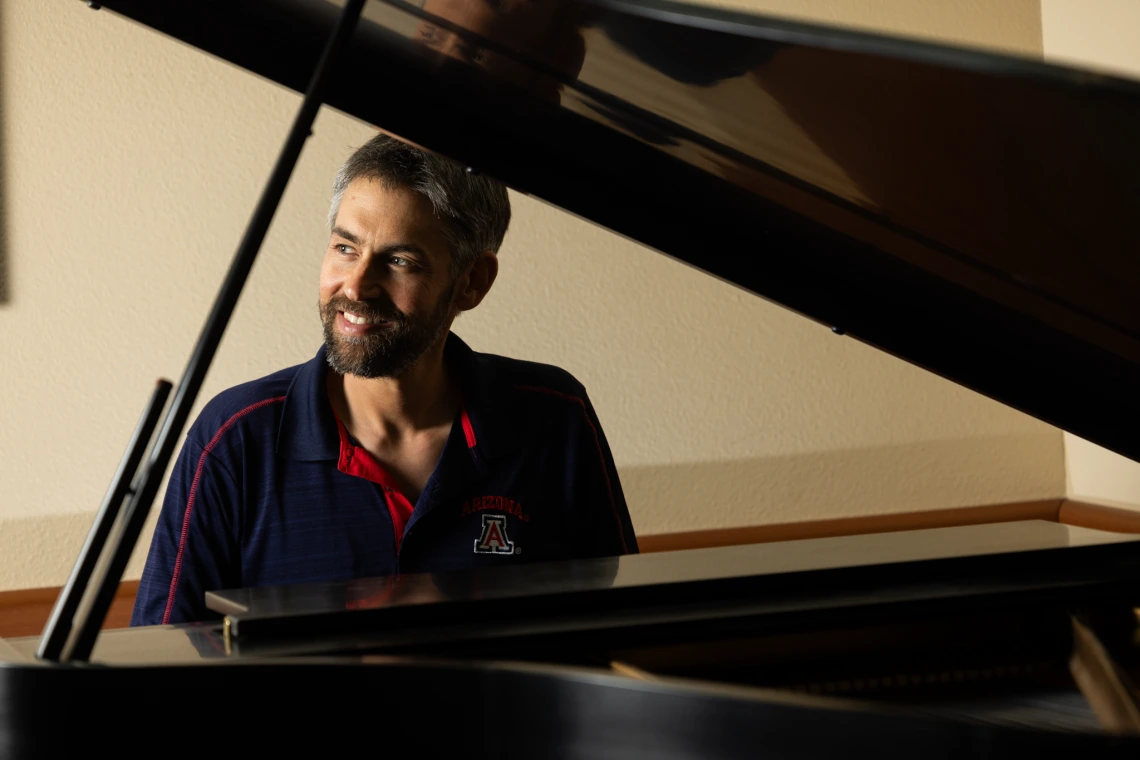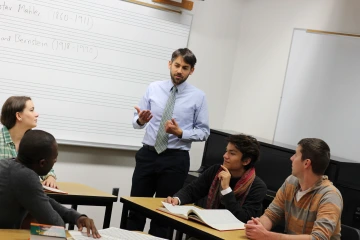Right on CUES
A dynamic center is changing the educational landscape.

Matthew Mugmon
Chris Richards
The university learning experience isn’t static. Factors like advancements in technology, changes in the cultural landscape and global knowledge production all influence teaching and learning at the university level. In 2016, an anonymous donor who recognized the dynamic needs of a world-class educational institution offered a $3 million donation to found a center at the University of Arizona that would strengthen the practice of scholarship and innovation in teaching and learning: the Center for University Education Scholarship (CUES).
Now in its eighth year and supported by an $8.5 million endowment, CUES advances the university’s ecosystem of excellence by funding faculty research in new teaching methods, hosting workshops and promoting collaboration across the university. Its impact spans projects from advancing pedagogical tools to pioneering student-centered learning.
In 2024, Jennifer Jenkins, professor of English, launched Querencia, a project connecting Southwest Studies curricula with the Arizona borderlands. In 2023, Li Xu, professor of applied computing and computer science, integrated cybersecurity data sets into her course design to provide hands-on learning. In 2020, Diana Daly, associate professor of practice in the College of Information Science, created a student-centered media lab and think tank, and in 2019, Bryan Carter, professor of Africana Studies and director of the Center for Digital Humanities, improved faculty access to virtual reality tools.
Each year, CUES enables faculty to innovate and inspire with projects that have a lasting impact on the university’s educational landscape. Read on to take a deep-dive into an exciting CUES project — one that has reimagined the student experience while giving Wildcats the chance to make history.
In the heart of the University of Arizona’s Fred Fox School of Music, associate professor Matthew Mugmon’s Roots of Knowledge project engages undergraduate students in groundbreaking research, artistry and knowledge production, all made possible through philanthropic support. This endeavor does more than teach music history — it invites students to actively create it.
Undergraduate music history courses often focus on the basics: timelines, major composers and textbook narratives. While foundational, these approaches can overlook the diverse and even messy realities of music history. Roots of Knowledge invites students to navigate the uncharted wilderness of primary sources — including letters, manuscripts and artifacts — to dig up stories often left out of conventional accounts of music history.

Matthew Mugmon
Mindi Acosta
“Part of the goal is to have students learn how to create knowledge rather than just receive it,” Mugmon explains. “By engaging with primary sources, they’re piecing together a narrative that reflects a broader, more inclusive understanding of music history. It’s about getting their hands dirty with history and creating something meaningful.”
Roots of Knowledge blends historical research with new music creation. Students analyze past premiere compositions using primary sources to understand the context and impact of these works. The research generated by students in the course is then shared online, ensuring broader access to their insights. This exploration foregrounds their attendance of the live premiere of a new student-composed work at Crowder Hall. After the event, students create primary-source materials, such as letters, essays, guides or podcasts, offering context for future researchers.
Roots of Knowledge has a profound effect on students, challenging them to think critically and creatively. “I’m always delighted by the insights students uncover,” Mugmon says. “They’re making connections and thinking at a level we typically associate with graduate studies.”
“The assignment to research primary source material prompted me to reach out to a composer whose work I really enjoy and interview them about one of their works. It was a very special experience for me,” says Inez Smith ’26. “It was also really fun to be able to sit in on the premiere of a piece written by a fellow student.”
Beyond academic growth, the project fosters a sense of empowerment. Students are not just learning about history; they’re shaping it. Whether by bringing marginalized voices in music history to the surface or by creating new primary source material, they leave the class with a deeper appreciation for their role in the cultural continuum and conversation.
“There’s nothing like coming into direct contact with history — except for realizing that you’re actually a part of history, even if you don’t know what that’s going to look like,” Mugmon says.
This educational experience wouldn’t be possible without CUES and the generous donor who established its endowment. This funding is instrumental in commissioning new compositions and compensating the performers and composers who bring these works to life. Additionally, funding supports graduate assistants who refine and publish the students’ research online, making it accessible to a global audience.
“Philanthropy makes this project possible,” Mugmon emphasizes. “It’s not just about funding a class or a performance; it’s about supporting an ecosystem where students, composers and researchers can collaborate and thrive. It’s about making history together.”

